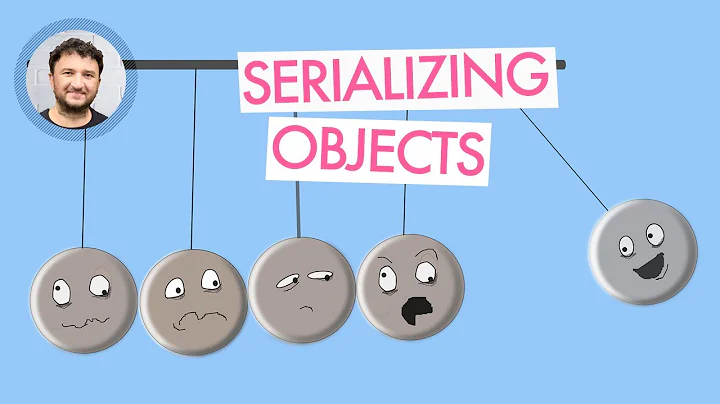Why do you have to mark a class with the attribute [serializable]?
Solution 1
First off, you don't have to.
It is simply a marker interface that tells the serializer that the class is composed of items that it can serialize (which may or may not be true) and that is can use the default serialization.
The XMLSerializer has the additional requirement to have a zero parameter constructor to the class.
There are other serializers that use contracts for serialization (such as the DataContractSerializer) - they give you more control over serialization than simply marking a class as Serializable. You can also get more control by implementing the ISerializable interface.
Solution 2
Binary serialization is pretty powerful, it can create an instance of a class without running the constructor and can set fields in your class that you declared private. Regular code can of course not do this. By applying the [Serializable] attribute, you explicitly give it the go-ahead to mess with your private parts. And you implicitly give that permission to only the BinaryFormatter class.
XML serialization doesn't need this kind of okay, it only serializes members that are public.
DataContractSerializer can serialize private members as well. It therefore needs an explicit okay again, now with the [DataContract] attribute.
Solution 3
It's basically metadata that indicates that a class can be serialized, nothing more.
It is required by a lot of framework serializers, which refuse to deal with types not having this attribute applied to them.
Solution 4
Serialization can create security holes and may be plagued by versioning problems. On top of that, for some classes, the very idea of serialization is outright nonsense.
For details, see the excellent answers to Why Java needs Serializable interface?, especially this one, this one, and this one. They make the case that serialization should be a feature you have to explicitly opt into.
For a counterpoint, the accepted answer to that question makes the case that classes should be serializable by default.
Solution 5
It indicates to the serializer that you want that class to be serialized as you may not want all properties or classes to be serialized.
Related videos on Youtube
Comments
-
Blankman about 2 years
Seeing as you can convert any document to a byte array and save it to disk, and then rebuild the file to its original form (as long as you have meta data for its filename etc.).
Why do you have to mark a class with
[Serializable]etc? Is that just the same idea, "meta data" type information so when you cast the object to its class things are mapped properly? -
Lasse V. Karlsen about 14 yearsIt can only be applied to types, not members.
-
Raquel about 14 yearsThe XmlSerializer does not require SerializableAttribute
-
John Saunders about 14 years@Oded: -1 until you edit your answer to show that the
XmlSerializerdoesn't care about[Serializable]. -
 Oded about 14 years@Matthew Whited, @John Saunders - thanks for the correction. Answer updated.
Oded about 14 years@Matthew Whited, @John Saunders - thanks for the correction. Answer updated. -
Michael Stum about 14 yearsJust chiming in to recommend the chapter about serializing in "Framework Design Guidelines" by Krzysztof Cwalina and Brad Abrams which explains a bit when to use what from the standpoint of a Framework designer.
-
EMP over 13 yearsI think this is a bit misleading - it sounds like if I have a serializable class A with a member B of a non-serializable type then member B will be ignored. In actual fact, serializing A will throw.
-
Daniel Mošmondor over 13 yearsYou do have to. BinaryFormatter WON'T budge otherwise! I mean, it will throw on you...
-
Thomas almost 11 yearswhen it is not require decorate a class with serializable keyword then why peole do it...any special reason?
-
tsemer over 10 years-1 until answer is corrected: Against popular belief, DataContractSerializer does not force you to mark a class [DataContract], it is a choice. When no attribute decorates the class, the serializer will by default infer a contract of all public read/write properties and fields. See MSDN: msdn.microsoft.com/en-us/library/ms733127%28v=vs.110%29.aspx
-
user1703401 over 10 yearsThe word "public" in that sentence appears to mystify you.
-
nawfal almost 10 yearsJust in case it helps somebody, DataContractSerializer doesn't need [DataContract] attribute necessarily. [Serializable] will do (by which you also need not mark everything you need to serialize by [DataMember]).
-
nawfal almost 10 years@Thomas this thread is all about answering that question. See Hans's answer, clearer. Basically, it is not required to if all you care about is public members (for non-public you do need some serializable attribute). You also do need if you have some custom requirement (like excluding some field).
-
nawfal almost 10 yearsbut cant interoperate with non .NET domains.
-
 Vilx- about 9 yearsFun fact: with the help of the
Vilx- about 9 yearsFun fact: with the help of theFormatterServicesclass, you too can create uninitialized objects! Evil! :) -
Some Guy about 2 years"Regular code can of course not do this."
-
Some Guy about 2 yearsCan't you just write a setter method to change private fields?






![Serializing Custom Classes [Unity Tutorial]](https://i.ytimg.com/vi/5fhTXnos_go/hq720.jpg?sqp=-oaymwEcCNAFEJQDSFXyq4qpAw4IARUAAIhCGAFwAcABBg==&rs=AOn4CLAX86FP9tEgEpgOlB8TRdD_IcLo-A)




